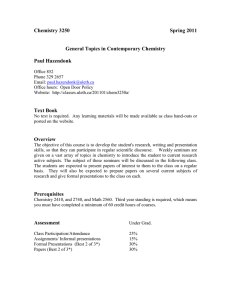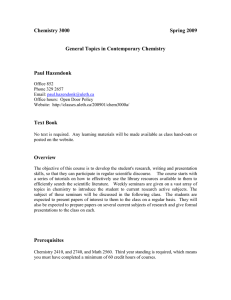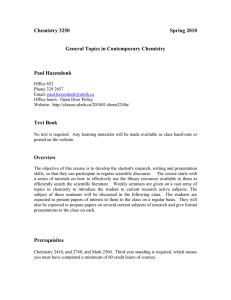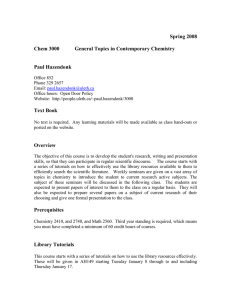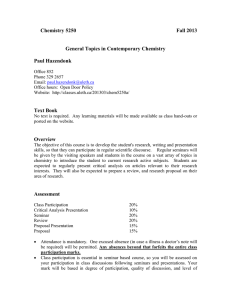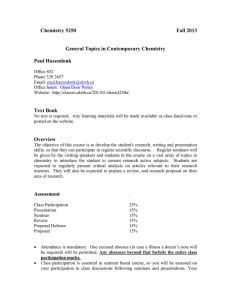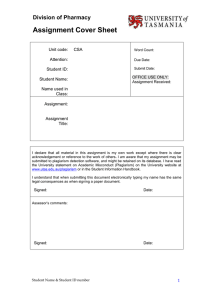Chemistry 3250 Spring 2013 General Topics in Contemporary Chemistry
advertisement
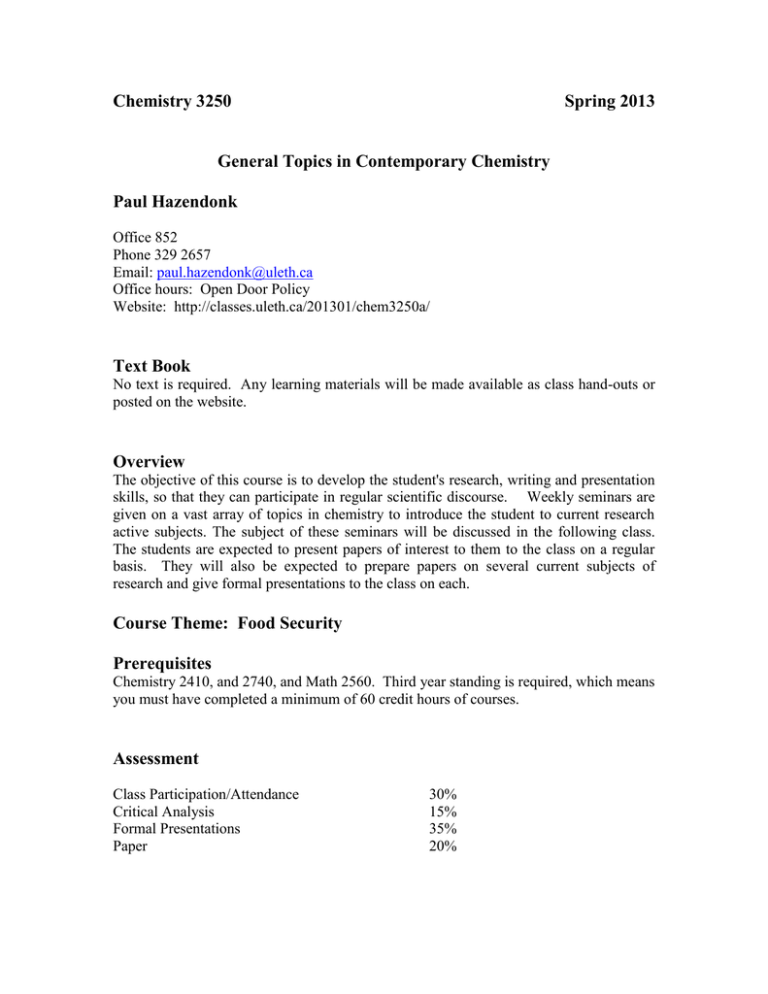
Chemistry 3250 Spring 2013 General Topics in Contemporary Chemistry Paul Hazendonk Office 852 Phone 329 2657 Email: paul.hazendonk@uleth.ca Office hours: Open Door Policy Website: http://classes.uleth.ca/201301/chem3250a/ Text Book No text is required. Any learning materials will be made available as class hand-outs or posted on the website. Overview The objective of this course is to develop the student's research, writing and presentation skills, so that they can participate in regular scientific discourse. Weekly seminars are given on a vast array of topics in chemistry to introduce the student to current research active subjects. The subject of these seminars will be discussed in the following class. The students are expected to present papers of interest to them to the class on a regular basis. They will also be expected to prepare papers on several current subjects of research and give formal presentations to the class on each. Course Theme: Food Security Prerequisites Chemistry 2410, and 2740, and Math 2560. Third year standing is required, which means you must have completed a minimum of 60 credit hours of courses. Assessment Class Participation/Attendance Critical Analysis Formal Presentations Paper 30% 15% 35% 20% Attendance is mandatory. One excused absence (in case a illness a doctor’s note will be required) will be permitted. Any absences beyond that forfeits 10 from the 30 class participation marks. Class participation is essential in seminar based course, so you will be assessed on your participation in class discussions following seminars and presentations. Your mark will be based in degree of participation, quality of discussion, and level of preparation (all articles on which the presentation are prepared will be made available on course website), in each class on a per class basis. Also, adherence to deadlines will be a considered. Informal group presentations will be given on a general choice were the student is expected to analyze the articles according to specified criteria. The class will be given a paper on which they are expected to prepare a written critical analysis (minimum 1500 words). See website for instructions. Each student is expected to give two short (20 minute) original presentations on topics related to the general course theme, and those have not been or will be presented in any other course. They will be expected to explain the theoretical and practical basis of the study and discuss its relevance. Student discussion will be encouraged after each presentation. All topics to be presented have to be approved by the instructor at least one week before hand. Instructions will be posted on the website. The slides for each presentation must be turned in for assessment. Failure to submit the slides will result in a penalty of 5 % to be taken from your class participation mark will be assessed Upon successful completion of the final presentation the student will prepare a formal paper (minimum 1500 words) on topic presented. Instructions will be posted on the website. All papers are due within one week of the presentation, unless arranged otherwise. Late submission will be subject to a penalty of 10% per day from your class participation mark. No paper can be submitted without the presentation being completed beforehand. *All three papers must be submitted in electronic form and be completed for final assessment; otherwise an average over all three papers will be assessed in the final grade. Seminar Schedule and Presentation Schedule See the course website at http://classes.uleth.ca/201301/chem3250a/ for updated information/ Cheating: IF YOU ARE CAUGHT CHEATING YOU WILL BE ASSIGNED A GRADE OF F INSTANTLY AND A LETTER DESCRIBING YOUR OFFENSE WILL BE PLACED IN YOUR STUDENT FILE. TWO SUCH LETTERS IS GROUNDS FOR EXPULSION FROM THE UNIVERSITY. STUDENTS WHO CHEAT, CHEAT THEIR FELLOW STUDENTS. It is important that you understand what constitutes plagiarism. Plagiarism is defined as the taking of someone else’s thoughts, writings or inventions and using them as one’s own. When you are writing a paper on some topic, you must read up on the topic, get the necessary information and then present it IN YOUR OWNWORDS. If you use a sequence of text verbatim (i.e. exactly) from someone else’s work, THAT IS A QUOTE and must be cited (to give proper credit to the author) in a particular way. If you use an idea or data from someone else’s work, then that work must be cited specifically as a reference, and/or in your paper’s bibliography. Beware of information that is found on the web -- it is rarely primary source information. IF, IN THE COURSE OF WRITING A PAPER, YOU EXECUTE A CUT AND PASTE FROM A WEBSITE OR OTHER SOURCE without any citation, YOU HAVE COMMITTED PLAGIARISM. There is a difference between working together with a friend and plagiarism. If, after conferring with others, what you write down is based on your understanding of the topic and is in your own words, then that is acceptable. If, however, you look at a friends answer to a question, and then simply write (essentially) the same thing on your assignment, then you have committed plagiarism. PLAGIARISM IS CHEATING and is subject to discipline as described in the university calendar. If you are unclear about this issue, then speak to your instructor. Reusing materials submitted for grades in a previous class constitutes a form of plagiarism and will the treated accordingly.
